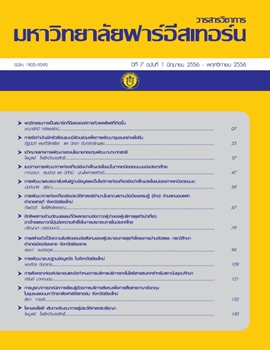พฤติกรรมการเป็นสมาชิกที่ดีขององค์การกับผลลัพธ์ที่เกิดขึ้น
Main Article Content
Abstract
จากการทบทวนวรรณกรรม และการตั้งข้อสังเกตจากการปฏิบัติในเชิงบริหาร บทความนี้กล่าวถึงพฤติกรรม การเป็นสมาชิกที่ดีขององค์การ (Organization Citizenship Behavior หรือ OCB) 4 ประเภทได้แก่ (1) พฤติกรรม การเป็นสมาชิกที่ดีขององค์การ: การเห็นแก่ประโยชน์ของผู้อื่นเป็นที่ตั้ง บนพื้นฐานคุณลักษณะส่วนบุคคล (Altruistic OCB Based on Personality) (2) พฤติกรรมการเป็นสมาชิกที่ดีขององค์การ: ความรับผิดชอบ บนพื้นฐานการตอบแทน และการแลกเปลี่ยนผลประโยชน์ระหว่างกัน (Responsible OCB Based on Reciprocity) (3) พฤติกรรมการเป็น สมาชิกที่ดีขององค์การ: ในเชิงเครื่องมือบนพื้นฐานผลประโยชน์ส่วนตน (Instrumental OCB Based on Self-Interest) และ (4) พฤติกรรมการเป็นสมาชิกที่ดีขององค์การ: ในเชิงบังคับ บนพื้นฐานจากความกดดัน (Compulsory OCB Based on Stress) พฤติกรรมการเป็นสมาชิกที่ดีขององค์การทั้ง 4 ประเภทจะทำให้ทราบถึงพหุระดับพฤติกรรมของ การอาสาช่วยเหลือของบุคคล และผลลัพธ์ของพฤติกรรมการเป็นสมาชิกที่ดีขององค์การที่มีต่อองค์การและปัจเจก บุคคล ภายใต้สถานการณ์เฉพาะเจาะจงและพหุปัจจัยจากสิ่งแวดล้อมขององค์การ
Through literature review and induction from management practices, this paper firstly identifies four subtypes of Organizational Citizenship Behavior (OCB), namely altruistic OCB based on personality, responsible OCB based on reciprocity, instrumental OCB based on self-interest, and compulsory OCB based on stress. The four OCB subtypes constitute an OCB continuum in the order of an individual’s degree of voluntariness. Both the positive and negative impacts of the four OCB subtypes on organizations and individuals are analyzed. Conclusions, limitations and future research directions are presented.
Article Details
1. Any views and comments in the Journal of Social Innovation and Lifelong Learning are the authors’ views. The editorial staff have not to agree with those views and it is not considered as the editorial’s responsibility.
2. The responsibility of content and draft check of each article belongs to each author. In case, there is any lawsuit about copyright infringement. It is considered as the authors’ sole responsibility.
3. The article copyright belonging to the authors and The Far Eastern University are copyrighted legally. Republication must be received direct permission from the authors and The Far Eastern University in written form.

